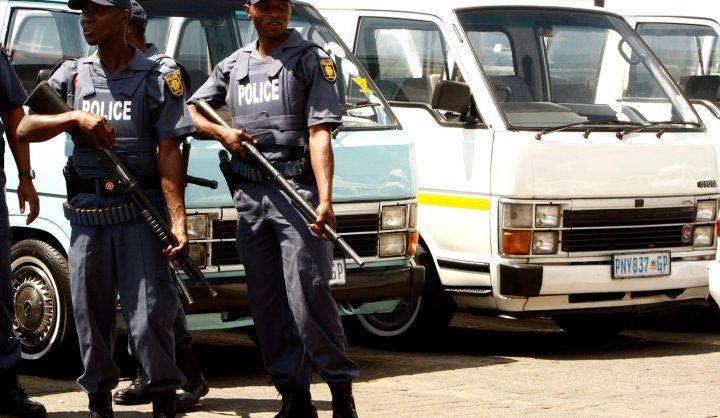South Africa
Analysis: Taxi rapes highlight victims’ police station struggles

Nine people have come forward as recent survivors of rape in taxis in Johannesburg. Amid the horrifying allegations there’s a persistent suggestion: some SAPS officials are still not taking rape and sexual assault cases seriously. By GREG NICOLSON.
As victims continue to come forward to report cases of rape in taxis in Johannesburg, which has largely been linked to the ongoing plague of violence against women and a lack of safety in the taxi industry, cases emerging this weekend highlight problems within the policing and justice systems, which, it is suggested, fail women after crimes have been committed.
There are no conclusive studies on how many rapes occur compared to how many are reported, but estimates suggest that only a small fraction of crimes are taken to the police. Few are ever prosecuted and even fewer result in convictions. As serious crime continues to be a major concern for South Africans, a key problem limiting the justice system’s attempts to clamp down on rape and sexual assault is how women are treated when they report cases.
Gauteng Community Health MEC Sizakele Nkosi-Malobane this weekend said that of the nine people who have come forward with allegations that they were raped and/or robbed on taxis around Johannesburg, two struggled to get assistance from police. Multiple victims have come forward this week after reports detailed how a woman was raped for four hours in a taxi in front of her 10-year-old son.
“Two of the victims actually indicated they did go to police stations. There was issues of jurisdiction. Remember they were picked up in one police precinct and raped in another,” said the MEC. “Instead of the police and that particular station where they went to report taking them where they were picked up they actually sent them from pillar to post.” She said her department and the police are investigating the failure of the SAPS to provide victims with their rights.
Reports of police officers denying rape or sexual assault victims their rights are common. It might be due to issues over jurisdiction, victim blaming, or an officer believing such cases should be resolved within a community rather than through the criminal system.
Rape Crisis Cape Town Trust has detailed victims’ rights:
- They can report, and provide, as well as receive information about the crime.
- They must be treated with dignity and respect.
- Those reporting rape have the right to speak to a female officer and speak in their own language, in a private room.
DA Gauteng spokesperson for social development, Justus de Goede, said on Sunday that SAPS officers need more training on dealing with victims of trauma. “The lack of training of SAPS members also creates an atmosphere where members of the public do not report crimes as they are afraid of the SAPS.”
Police officials have made some inroads in training officers in sensitivity regarding rape and sexual assault cases, but De Goede said the MEC must do more in Gauteng and “establish a programme through which SAPS members can undergo trauma and sensitivity training to better serve the residents of Gauteng”.
Mbuyiselo Botha, a commissioner for the Commission for Gender Equality, said on Sunday, “The disappointing thing in all the sensitisation [interventions], they are not long-term, they are not sustainable.” He called on SAPS’s programmes to be better resourced. From the commission’s experiences, he said, police officers provide a “mixed bag” of responses to such crimes. Sometimes they handle cases well, at other times they suggest that rape cases should be resolved as family or community matters, rather than as crimes. Sometimes officers act as social workers or psychologists when they don’t have such experience or legal backing to do so.
Some officers, he said, aren’t well trained or sensitised to issues of rape and sexual assault. They don’t know the law and cause “secondary victimisation” – failing to help someone reporting a case. “That discourages women who throw their hands up in despair, who ask, ‘What’s the point of breaking the silence?’” An unfair and unjust system discourages others from reporting their cases.
Rape Crisis Cape Town Trust director Kathleen Dey said people often don’t know their rights or how the justice system works. They don’t know how to navigate the issues of the system or that rape cases involve lengthy processes of physical examination and interviews even before issues will be taken to court.
“People don’t know,” said Dey. Victims can be denied their rights and they don’t know enough to demand such rights. “They have an absolute right to be treated with respect and dignity.” That’s even if a victim reports a case while drunk, she noted. Dey said vulnerable groups, like children or those who identify as LGBTIQ, might be disrespected, adding to their barriers to accessing the justice system.
Her organisation is part of a campaign focusing on prosecutors. The campaign hopes that if prosecutors, with convictions being the end goal, up their game, the lengthy chain of stakeholders in rape cases, who interact with victims before cases hit the courts, will also improve. “Reporting to the police station is just the beginning,” she said.
Dey is based in Cape Town and said that, compared to five years ago, there are far fewer reports of poor police responses to rape allegations at police stations. “I think it’s a very positive thing, absolutely,” she said on attempts by the SAPS to sensitise officers. But there’s no blanket policy across the country. Approaches differ according to province and region.
MEC Nkosi-Malobane on Sunday said that one suspect has been arrested for the taxi rape cases, while at least one other is wanted by police. DM
Photo: Police officers stand guard during a protest by taxi operators against the roll-out of the latest phase of Johannesburg’s Bus Rapid Transit (BRT) in Soweto March 15, 2010. REUTERS/Siphiwe Sibeko

















 Become an Insider
Become an Insider